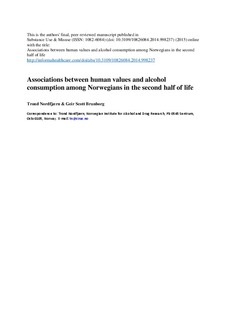| dc.description.abstract | Previous studies investigating human values and alcohol consumption have focused on adolescents, so the current study examined associations between human values and alcohol consumption in a cohort of Norwegians in the second half of life (40 years and above). Human values were studied within Schwartz’ theory [Schwartz, S. H. (1992). Universals in the Content and Structure of Values: Theory and Empirical Tests in 20 Countries. In M. Zanna (Ed.), Advances in Experimental Social Psychology (Vol. 25, pp. 1-65). New York: Academic Press.] A survey was conducted in 2002/2003 among Norwegians aged 40 to 79 years (n = 4 149). The respondents completed measures of human values, drinking frequency and typical drinking quantity. Females (9%) were more likely to report abstinence than males (3%). Males also reported a higher consumption level. Individuals with high education had lower levels of abstinence (4%) than those with basic education (7%), and high education was also related to more consumption. People aged 40-60 years were less likely to abstain from alcohol (3%) than individuals aged 61 years and above (10%). Unmarried individuals were more likely to report abstinence, but also reported somewhat higher consumption than married individuals. Multivariate analyses adjusting for demographics as well as somatic and mental health showed that Hedonistic values were related to lower probability of abstaining, while Conformity and Universalism values were associated with a higher probability of abstaining. Achivement and Hedonism values were associated with more alcohol consumption, whereas Universialism, Tradition and Conformity were related to lower alcohol consumption. | |
